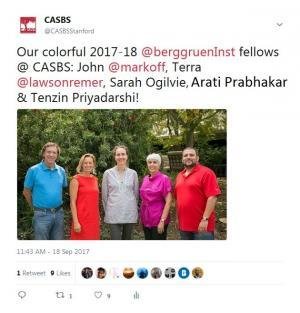
The Center for Advanced Study in the Behavioral Sciences (CASBS) at Stanford University welcomed its 2017-18 residential fellows class in September 2017.
The class is comprised of 38 fellows representing 25 institutions in the U.S. (19) and abroad (6). Twenty (53%) of the incoming fellows are female.
The new class of fellows also represent a diversity of fields across or intersecting with the social and behavioral sciences as well as the humanities: architecture, communication, economics, electrical engineering/applied physics, environmental science, history, journalism, law, linguistics, philosophy, political science, psychology, religion, sociology, and statistics.
Five Stanford faculty are members of the class: Susan Holmes, professor of statistics and The John Henry Samter University Fellow in Undergraduate Education; Sarah Ogilvie, lecturer in linguistics and digital humanities coordinator at the Center for Spatial and Textual Analysis; Nathaniel Persily, the James B. McClatchy Professor of Law; Debra Satz, the Marla Sutton Weeks Professor of Ethics in Society and former Senior Associate Dean for the Humanities and Arts (2010-17); and Beth Van Schaack, the Leah Kaplan Visiting Professor in Human Rights at the Stanford Law School.
Several fellows are supported by the Center’s partner fellowship programs: five by the Berggruen Institute’s Philosophy + Culture Center, one by the William T. Grant Scholars Program, and one by the American Council for Learned Societies. In addition, the Center is pleased to welcome its inaugural Presence-CASBS fellow courtesy of a partnership with Presence, a center at the Stanford Medical School led by National Humanities Medal recipient Dr. Abraham Verghese; as well as its inaugural Stanford-Taiwan Social Science fellow, sponsored by a new partnership with the Science and Technology Policy Research and Information Center within the National Applied Research Laboratories of Taiwan, a federal government agency.
"The fellows program lies at the heart of the CASBS enterprise,” said Sally Schroeder, the Center’s associate director. “Fellows represent all that is great about this place. It’s imperative that we continue to attract the highest quality, innovative thinkers, and we’re confident we’ve reached that standard of excellence once again with the 2017-18 class.”
Nearly all members of the new class figure to play a role in the Center's broadening and deepening of connections with Stanford, thereby stimulating the intellectual life of CASBS as well as the university at large.
Notable fellows in the 2017-18 CASBS class include John Markoff, the renowned 28-year, recently-retired technology journalist for the New York Times; and Arati Prabhakar, an accomplished applied engineer and administrator who served as head of the U.S. Defense Advanced Research Projects Agency (DARPA) from 2012-17; and The Venerable Tenzin Priyadarshi, philosopher-ethicist and Buddhist monk who directs the Ethics Initiative at the MIT Media Lab as well as the MIT-wide Dalai Lama Center for Ethics and Transformative Values Both. All three were featured speakers in a panel discussion at CASBS devoted to artificial intelligence, automation, and their impacts on humans and society. The free public event took place on Tuesday, November 14.
The class also includes John Hagan, the John D. MacArthur Professor of Sociology and Law at Northwestern University, recently-elected to the National Academy of Sciences.
The class of fellows is joined by a group of two visiting scholars, five research affiliates, and six faculty fellows. The latter designation is new and reserved for Stanford faculty who affiliate with the Center. This year's faculty fellows are Raj Chetty, David Grusky, Roberta Katz, Arnold Milstein, Woody Powell, and Abraham Verghese.
Read bio-sketches and descriptions of research interests of the 2017-18 CASBS fellows, visiting scholars, and research affiliates and faculty fellows.
# # #
Since its inception in 1954, researchers associated with the Center for Advanced Study in the Behavioral Sciences (CASBS) at Stanford University have explored vexing questions and concerns. They have created and extended knowledge of our world and contributed to evidence-based policy and solutions. More than 2,500 fellows have flourished on the Center’s hilltop campus, among them luminary figures in the nation’s public and intellectual life. Kenneth Arrow, Erik Erikson, Henry Louis Gates, Jr., Ruth Bader Ginsburg, Albert Hirschman, Daniel Kahneman, Arthur Koestler, Thomas Kuhn, Sara Lawrence-Lightfoot, Robert Merton, John Rawls, Edward Said, Deborah Tannen, Amos Tversky, and Oliver Williamson are just a few examples. CASBS alumni include 26 Nobel Laureates, 24 Pulitzer Prize winners, 51 MacArthur fellows, and 26 National Medal of Science winners. Learn more at https://casbs.stanford.edu and here.
